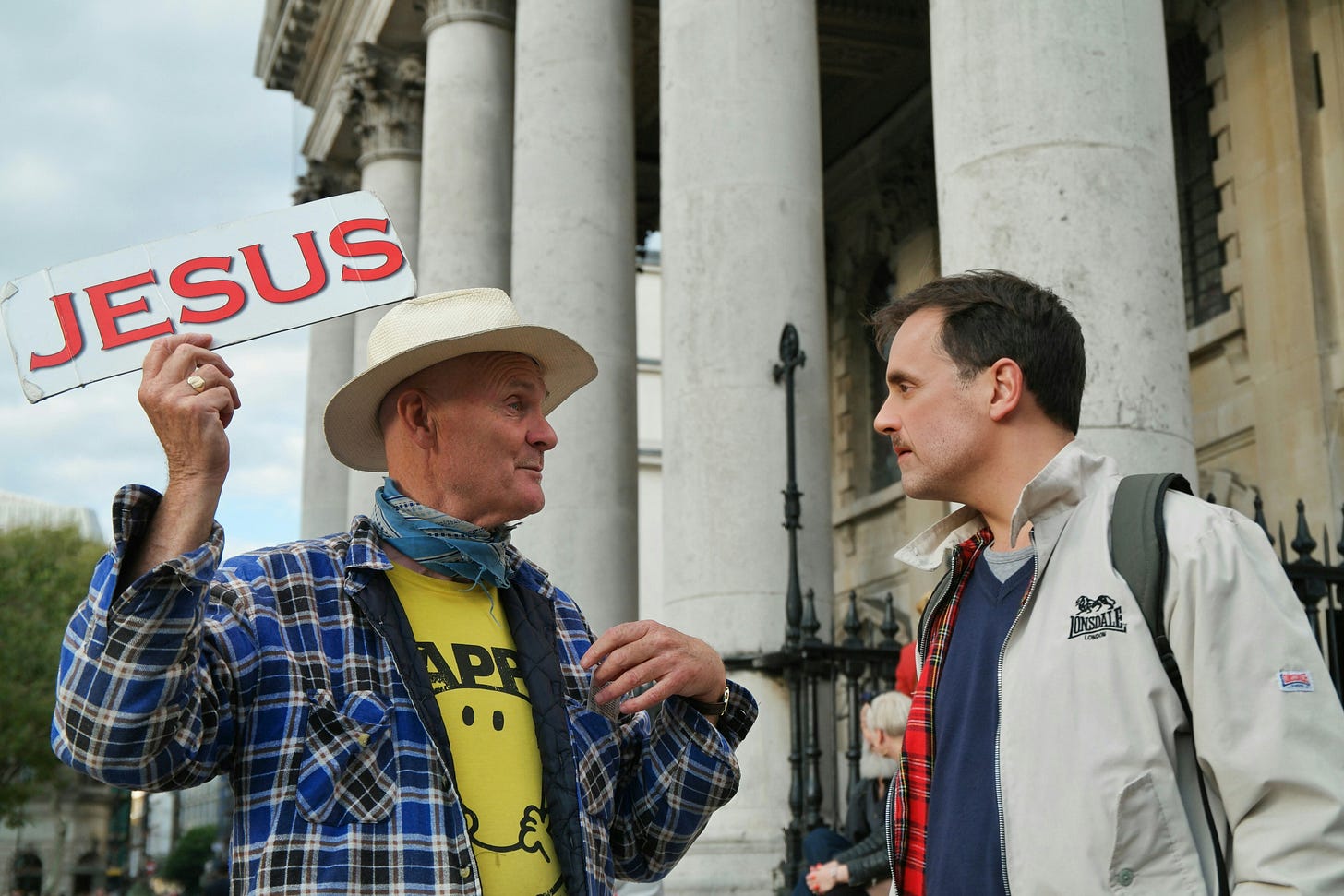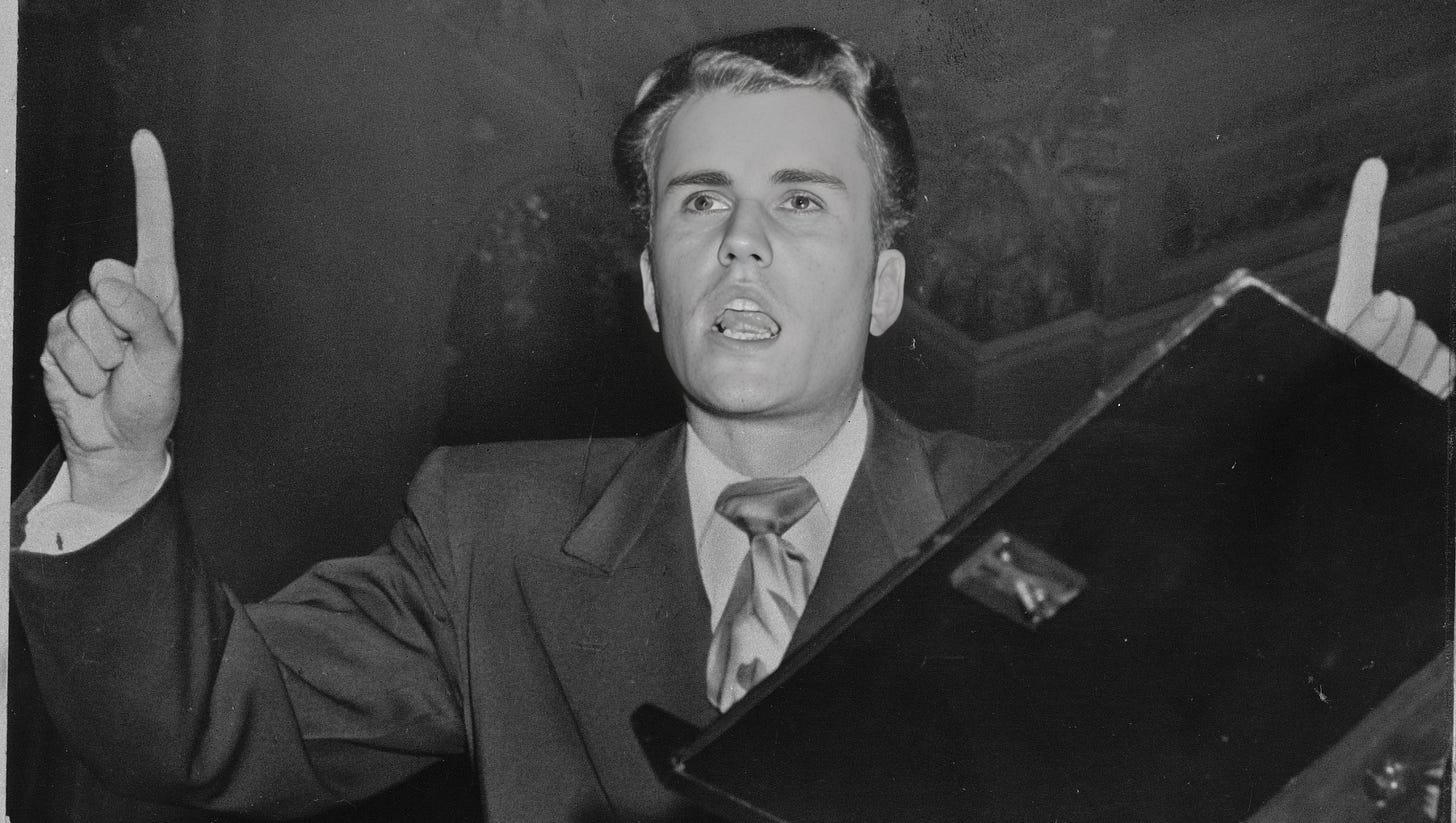Jordan Peterson: He Who Wrestles With God
"Not everyone who says to me, 'Lord, Lord,' will enter the kingdom of heaven, but the one who does the will of my Father."
The evangelical takes on Jordan Peterson’s “We Who Wrestle With God” tour are coming out. Jake Meador attended Peterson’s lecture in Omaha and says that Peterson’s ideology is focused on excellence to the exclusion of mercy. Aaron Renn attended in Indianapolis and says that Peterson’s message is, at the end of the day, a New Age alternative to Christianity.
Anna and I attended on Valentine’s Day in St. Louis. It was a moving experience. Here are some of our reflections.
Anna’s Reflections

Going to hear Jordan Peterson was quite a life event for me. Like many others, I started listening to him in 2016 when he splashed onto the stage after protesting Bill C-16 in Canada. I spent much of 2017 struggling with depression, and the best help I found was in the hours I spent listening to him talk about meaning, mental health, and motivation for living. I still remember the streets I walked as I listened to his lectures and the puzzles I did as I listened to his debates with Sam Harris.
Since then, I was greatly moved by his health issues and identified with much of his suffering and depression. I am also deeply grateful for the world of people to which he has introduced me: Jonathan Haidt, Camille Paglia, Douglas Murray, Dave Rubin, Sam Harris, Jonathan Pageau, Andrew Huberman, Abigail Shrier, Slavoj Zizek, and countless others.
Going to see him was like going to meet my hero in real life, and even though I’d heard much of the material before, I was no less amazed by his talk. These days, I don’t get to listen to much undistracted. I struggle to get things from sermons because three kids clamor for my attention. Some of my euphoria probably came from sitting uninterrupted, just listening and thinking, for two hours straight.
However, there was much more to my enamor with Peterson. I have never heard someone be able to “riff” on Genesis 2–3 for that long with that much insight. I’ve been in the evangelical world all my life, so I have heard countless sermons, read many books and articles, and taught on that passage many times. Yet I hear more new truths from Peterson than from anyone else.
Peterson’s greatness comes from being one of our day’s greatest conversationalists. I don’t care for his writing (I won’t read his books) or Twitter habits, but he is incredible at leading you through a conversation, which is a skill that is sorely lacking today. Most pastors and professors talk at you, whereas Peterson helps lead you through truths, even when monologuing for 90 minutes. He is even better when having a conversation with someone like Camille Paglia, Sam Harris, or Douglas Murray.
“Wrestling with the truth” is how Peterson talks and thinks, and I am dismayed to hear criticisms of him from Christians that neglect this. They come from both the more conservative who don’t find him pure enough and from the more liberal who say he’s too capitalist or right-wing. But both miss the actual content and truth of what he is offering to millions of people.
Peterson’s project to help others with the problem of pain is also my goal in counseling. Suffering in this life is our greatest issue and what keeps people from believing in God. And even as a Christian, I am not finding answers to suffering in the Christian world but in Peterson’s material and interviews. Jungianism, symbolism, and archetypes are all vehicles to get at the truth, not hindrances.
His interview with Pageau on suffering after his health scare was one of the greatest “how-to-talk-about-suffering” conversations I’ve ever heard. His interview with detransitioner Chloe Cole was an incredible window into how a great therapist can pull out someone’s story. His conversation with Camille Paglia opened my eyes to insights on postmodernism, gender, and other forms of feminism. In a Joe Rogan podcast, he offered an incredibly powerful take on Scripture.
Lastly, Peterson’s words on, and example of, marriage and family seems better than anything I have heard taught on in the church. Because we attended on Valentine’s Day, (so romantic, I know,) there was a lot about love and marriage. I loved seeing him and his wife Tammy do the event together. Much of Christian teaching on Genesis 1–3 tends to get caught up in the submission-in-marriage debate, but Peterson transcended this.
The church is in crisis, especially because of how many marriages fail and a lack of integrity in leaders. In his own marriage and life, Peterson has displayed integrity, love, and honor to his wife, so I want to listen to him on the subject of marriage.
Given our appreciation of Peterson, Joel and I may end up like these guys:
Peterson’s Rebuke to Evangelicals

At the beginning of his lecture in St. Louis, Jordan Peterson addressed directly those who would have him confess Christian faith.
This is my own rendition of what he said, constructed out of things he has also said elsewhere:
“People ask me, ‘Do you believe in God?’
And it’s like, why do you want me to say that I do? And to say it publicly?
It’s like you’re asking me to stand on a street-corner and loudly proclaim my own righteousness, my alignment with the highest good. It’s like, I’m not going to do that.
And anyway, who are you to declare that you are on the side of the highest good? Who are you to claim the name of Christ or God and to say that you really and truly believe it?
Because if you really believed that God existed, you would act as though he did in every moment and every way. I’m not ready to claim that. Are you?
So my answer remains, ‘I act as though God exists, and I’m terrified that he might.’
Prepare Ye the Way of the Lord

Some criticize Peterson for his focus on Jungian and literary archetypes over literal truth. They say that he offers an alternative religion of self-help and New Age instead of Christianity.
But this is a failure to hear Peterson. Peterson is not offering a religion. He is exploring the universal dimensions of morality and myth, the psychological significance of religion, both what religious stories mean for everyone even if they aren’t literally true, and what they would mean for our behavior if they were true, if we truly acted as if God exists.
Let’s deal with the theological objection first: Evangelicals read Peterson as offering a Pelagian gospel of self-salvation.
But what Peterson is actually articulating is the content of the natural law and the moral teachings of Christ.
Of course, evangelical theology, especially of the more intellectual variety, has recently been neglecting these for a gospel of free grace. Jesus’s “Unless your righteousness exceeds that of the scribes and the Pharisees” has been disemboweled:
“Unless your righteousness exceeds theirs - which it can’t and won’t by your power, so you need the righteousness of Christ! Then you can be justified even if your life is not exceptional.”
Peterson is raising the bar as high as Christ raised it. There is no salvation disconnected from bearing the fruit of righteousness.
One of the reasons we accuse Peterson is because we think that the content of revelation in Scripture is totally disconnected from God’s revelation in nature: The gospel story has no continuity with the rest of human religion, philosophy, and literature - all of which promote self-salvation. But Peterson’s message is that the biblical story is one that has resonance with all the rest of human religion, philosophy, and literature, and that is even built into biology.
This brings us back to the question of the allegorical, moral, and psychological reading of Scripture. If we think that this is just an attempt to avoid the literal meaning of Scripture, we place ourselves outside of the mainstream of Christian theology through the centuries.
The consensus of Medieval Christian theology was that Scripture had a four-fold sense, in addition to the literal, there were the allegorical, the tropological (moral), and the anagogical (eschatological). Contemporary Protestants, the Reformed Evangelical in particular, are inclined to speak as though we have left behind the allegorical and moral altogether. Our Christ-centered preaching is the literal sense combined with seeing how it points to Christ.
But…that’s what the Medievals called the allegorical. The way in which the Old Testament could be read as embodying “types” of Christ (typological), is in turn deeply connected to seeing Christ as an archetype through all of history and literature. The depth of meaning of Scripture should indicate to us the depth of meaning of all literature and prime us to see Christ as distantly as the places where Peterson sees him.
At Wheaton College, Leland Ryken taught his evangelical students about the literary and archetypal reading of Scripture. This was necessary because the evangelical populace does not read the Bible as literature, but only as either a book of isolated one-liners or a textbook of true doctrine.
In showing believers and non-believers alike biblical archetypes throughout culture, history, and biology, Peterson is preparing the way for openness to wrestling with Scripture and with God.
Jordan Peterson presents believers and unbelievers with the archetypal and moral dimensions of biblical teaching. He argues for the psychological import of what the Bible presents.
Now, does Christianity teach more than what Peterson teaches? Yes, but it does not teach less than what Peterson teaches.
Unfortunately, for decades, if not centuries, Christianity has been teaching less than Peterson teaches. The realm of imagination and archetype has been abandoned.
In the first half of the 20th century, Christians were at the forefront of the realm of imagination and archetype. J.R.R. Tolkien exercised a Christian imagination in his works. But importantly, Tolkien resisted attempts to read his writing as allegory. A work is not a true work of imagination, but propaganda, if a heavy-handed writer moralizes to his audience. While Lewis’s allegory was relatively transparent (not that this has prevented non-Christians from enjoying the Chronicles of Narnia), Tolkien wanted to write a work that stood on its own by resonating with our human nature and taste for the fantastic.
Tolkien resisted being a “Christian writer.” As a result, we can imagine the evangelicals coming after him today for not naming Aragorn “Christagorn.”
Andrew Klavan, Daily Wire pundit and novelist, said that, when he became a Christian, he prayed the following prayer:
“Lord, you made me a writer, and you have now made me a Christian.
“But please do not make me a Christian writer.”
Why? Because a Christian writer performs a parochial task, for the other faithful. He writes Christian things to a Christian audience.
But only a writer who remains in the realm of the purely human, the archetypal, the natural, in this case, the realm of imagination, can speak effectively to all people and prepare the way of the Lord. The realm of imagination is a preparatio evangelium, a preparation for the gospel.
Celebrity Conversions
When we expect or ask Jordan Peterson to become a card-carrying, and card-displaying evangelical, it’s as though we’re comparing him negatively with Justin Bieber’s or Kanye West’s professions of faith. Genuine as they may be (we don’t know), they lack sturdiness. We know that celebrity conversions are unreliable historically. They are also compromised by their publicity.
It’s more exciting to see seeds take root quickly and flower immediately so that we can reap the harvest rapidly. It’s less compelling to wait for a farmer to spend years preparing the soil or to watch a seed take deep root when the sprout has not yet broken ground.
Peterson’s work has, in fact, significantly affected the quality and condition of the soil. Justin Brierley, in The Surprising Rebirth of Belief in God, details how the atheist-Christian debates of yesteryear have been almost entirely eclipsed. That is the soil in which my interest in theology and philosophy was cultivated. It helped to grow certain kinds of atheists and certain kinds of Christians. They were predominantly male, rather abrasive in their tone and habits of speech, and they had a habit of talking past each other.
If we have yet to see Peterson’s faith flower, we have already seen the fruit borne of his work as a farmer. Does he acknowledge the owner of the farm as his Lord? It’s difficult to say. But he’s doing the Lord’s work. In fact, he’s using methods of cultivation of which professing evangelicals have been ignorant. But are we more concerned to see our own methods of cultivation be perpetuated or to see the work be done?
The Parable of the Two Sons

“What do you think?
A man had two sons.
And he went to the first and said, ‘Son, go and work in the vineyard today.’
And he answered, ‘I will not,’ but afterward he changed his mind and went.
And he went to the other son and said the same.
And he answered, ‘I go, sir,’ but did not go.
Which of the two did the will of his father?”
They said, “The first.”










Well said. To mix in another parable, I tend to think the secret hidden in the Parable of the Sower (where Jesus explicitly says he tells parables so people will NOT understand) is that Jesus' ministry is almost more about soil-tilling than seed-planting. The truth (the seed) is simple and plenty. The problem is the lack of fertile soil. Jesus came to til the soil, to play the long game--not just to give us the truth, but to make sure the truth could go in. Jordan Peterson is an example of a good soil-tiller. And yes, I think Christians are called to adopt this method as our Savior did.
I’ve been highly critical of Peterson, but this article has persuaded me to ease up on some of my criticisms. This is partly because it reminded me that Peterson, in many ways, prepared the way for my own reversion to the Christian faith. When he first entered the public scene, I was captivated by what he had to say as it pointed beyond my shallow understanding of Scripture. But now, in 2025, my frustration stems from the realization that he’s been rehashing much of the same material he introduced in 2017. And this rehash reduces the full force of Scripture—often in tortured and convoluted prose—to Jungian archetypes with ties to neuroscience and evolutionary biology.
Consider your rendition of Peterson’s all-too-familiar response to the question of whether he believes in God:
“And anyway, who are you to declare that you are on the side of the highest good? Who are you to claim the name of Christ or God and to say that you really and truly believe it?
Because if you really believed that God existed, you would act as though He did in every moment and every way. I’m not ready to claim that. Are you?
So my answer remains, ‘I act as though God exists, and I’m terrified that He might.’”
While this response exemplifies Peterson’s sincerity and his commitment to wrestling with the true weight of living authentically, it also reveals his underlying confusion. When Peterson speaks of God as “the highest good,” he clearly doesn’t mean this in an ontological sense. His understanding often resembles Feuerbach’s critique of God as a projection of humanity’s highest values. If I’ve understood him correctly, when he says he is “not ready to claim” that he is “on the side of the highest good,” he confuses having faith with embodying the highest good entirely, rather than seeing faith as a pure, unmerited gift given even to those wholly unworthy of it.
Though Peterson’s understanding of faith is confused, his refusal to assent to a performative or superficial notion of belief is admirable. There’s conviction in his refusal to proclaim something he doesn’t fully grasp or live out.
This also brings to mind Kierkegaard’s "possibility of offense" in "The Sickness Unto Death." In that chapter, SK uses the parable of the emperor offering the poor man his daughter in marriage. SK argues that such an offer would be an incomprehensible scandal to the poor man, raising skepticism as to whether the emperor is sincere—or simply mocking him to “make fun of the poor fellow [and] render him unhappy for the rest of his life.”
Kierkegaard goes on to say:
“If there is anything that would make a man lose his understanding, it is surely this! Whosoever has not the humble courage to dare to believe it, must be offended at it. But why is he offended? Because it is too high for him, because he cannot get it into his head, because in the face of it he cannot acquire frank-heartedness, and therefore must have it done away with, brought to naught and nonsense, for it is as though it would stifle him.”
Perhaps, despite Peterson’s sincerity, his misunderstanding of faith—as something requiring full embodiment of the Good—offends him precisely because it feels unattainable. This is, as SK might put it, despair in disguise: a failure to recognize that grace is given freely to all, even to him—not as something to be embodied all at once, but as something that calls us, nevertheless, toward divinization.
Yet despite these criticisms, I can’t deny that Peterson does the Lord’s work, evidenced by the fruit he bears (my own conversion, or reversion, being testament to this). Perhaps my frustration lies in the fact that I see him failing to bear that same fruit in his own life (at least for now), remaining lost in the abstractions of Jungian archetypes, unwilling to move beyond myth in order to embrace the scandal of divine love, and the “humble courage to dare to believe.”
When it comes to authenticity and conviction, Kierkegaard surpasses Peterson with his critique of Christendom, his understanding of despair, and his conception of the self before God. But then again, Peterson was a gateway drug for me—leading not only to thinkers like Kierkegaard but the Gospel itself.